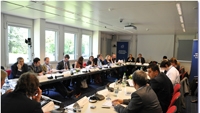EBU pledges support for media freedom
The professional video industry's #1 source for news, trends and product and tech information. Sign up below.
You are now subscribed
Your newsletter sign-up was successful

The EBU staged a conference on media freedom in Azerbaijan last week in the hope this would defuse criticism over its decision to allow that country to host its flagship event, the Eurovision Song Contest, this month.
But, it partly backfired because, while human rights advocates attended the event, they criticized the EBU afterwards for failing to take the opportunity to speak out about the country’s alleged continuing abuses of its media.
"The European Broadcasting Union should speak out about Azerbaijan's appalling record on freedom of expression in the lead-up to the Eurovision song contest," said Human Rights Watch in a statement. The campaign group alleged that journalists in the energy rich Caspian Sea state led by strongman President Ilham Aliyev were still "frequently subject to harassment, intimidation and physical attacks.”
The EBU was aware of the country’s poor human rights record when it awarded the hosting to the country, but gambled that this itself would persuade its government to cease persecuting journalists and fall in line with other countries in the wider membership area of the Council of Europe, which includes several neighboring Asian states including Azerbaijan.
There had been signs of an improvement, and the EBU had been hoping that last week’s conference would both provide firm evidence that the country had reformed its approach to the media, and act as a stage to discuss in general how freedoms of expression and information can preside over narrow political or economic interests. Another question described by the EBU as central to the conference was that of ensuring that people have free access to their chosen media outlet.
The conference was attended by the Council of Europe, the Government of Azerbaijan, several EBU television and radio members, and the key human rights organizations including Amnesty International, Human Rights Watch, as well as the Azerbaijan Media Center and Azerbaijan League of Independent Journalists. At the end of the conference, Ali Hasanov, Azerbaijan’s Head of Public and Political Issues, promised his government would investigate fully a number of alleged cases of jailed and mistreated journalists that were raised by various participants throughout the day. He also said the government was open to changing state laws to reduce defamation to a civil, and not a criminal, offense, which would reduce the scope for persecuting journalists.
But, despite raising cases of alleged mistreatment, the human rights groups were dissatisfied with the conference outcome, as they have been with the EBU’s handling of the situation generally, arguing that it has missed an opportunity to take a strong line against Azerbaijan over human rights and media freedom. Most human rights advocates opposed allowing Azerbaijan to host the Eurovision Song Contest in the first place, but some concede there was a case for doing so providing the opportunity was grasped to take a strong line on media freedom.
The professional video industry's #1 source for news, trends and product and tech information. Sign up below.
The EBU stated that the Eurovision Song Contest was an apolitical event, but insisted that it believed strongly in media freedom. EBU Director General Ingrid Deltenre, who chaired the conference, said, “the discussions took place in a very constructive and open atmosphere of mutual respect. All participants agreed that free and independent media, together with technological infrastructures and legislative frameworks that allow unrestricted, uncensored distribution of media content, are cornerstones of any democracy.”
The EBU is hoping is that the country’s hosting of the Song Contest will still ultimately lead Azerbaijan to the promised land of media freedom, and that the global exposure around the event will have a positive effect. This line has received some support from Azerbaijani (Azeri) journalists, including Ismailova, who works for Radio Free Europe. Ismailova claimed she was the target of a blackmail attempt when a video purporting to show her engaged in sexual activities was released on the Internet. She believes the campaign was aimed at halting her investigations into the financial dealings of President Ilham Aliyev and his family.
But, now she says that the Eurovision Song Contest provides an opportunity “for reporters to shine a light on Azerbaijan.”
“Boycotting is something that won't work,” Ismailova added. “It's better to convince people to come to Eurovision to talk about democracy, human rights and political prisoners. Part of the reason why the government is so harsh on the critics and journalists who are revealing all this is because they don't want the reality to be shown. They only want to show the façade of the country."
Time will tell whether this is right, but either way the situation has exposed the delicate balance faced by the EBU and other such organizations between imposing sanctions on member countries that restrict media freedom and encouraging reform through participation.
